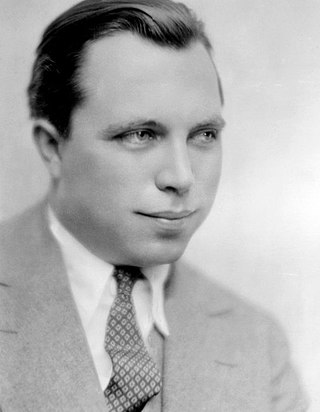
King Wallis Vidor was an American film director, film producer, and screenwriter whose 67-year film-making career successfully spanned the silent and sound eras. His works are distinguished by a vivid, humane, and sympathetic depiction of contemporary social issues. Considered an auteur director, Vidor approached multiple genres and allowed the subject matter to determine the style, often pressing the limits of film-making conventions.
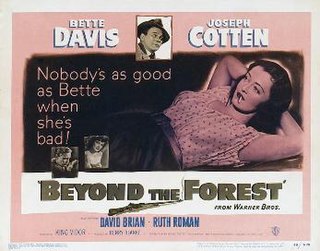
Beyond the Forest is a 1949 American film noir directed by King Vidor, and featuring Bette Davis, Joseph Cotten, David Brian, and Ruth Roman. The screenplay is written by Lenore Coffee based on a novel by Stuart Engstrand.
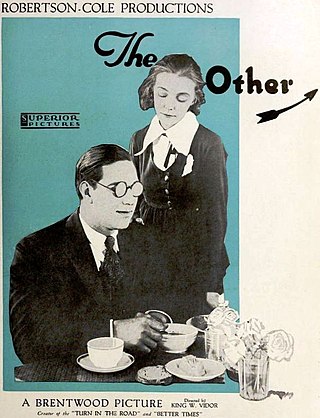
The Other Half is a 1919 American drama film directed by King Vidor. Produced by the Brentwood Corporation, the film starred Vidor’s wife Florence Vidor and featured comedienne Zasu Pitts.
The Lost Lie is a 1918 American short comedy film directed by King Vidor.
Bud's Recruit is a 1918 American short comedy film directed by King Vidor. A print survives at the UCLA Film and Television Archive. In February 2020, the film was shown at the 70th Berlin International Film Festival, as part of a retrospective dedicated to King Vidor's career.

The Turn in the Road is a 1919 American silent drama film directed by King Vidor. His first feature film, the production was financed by the Brentwood Film Corporation and the title and the scenario based on a Christian Science religious tract. No print of this film is known to exist, which suggests that it is a lost film.

Better Times is a 1919 American silent comedy film directed by King Vidor. A print survives in the EYE Institut Filmmuseum Nederlands. Produced by the Brentwood Corporation, the film stars the then unknown Zasu Pitts in an early screen appearance.
Poor Relations is a 1919 American silent drama film directed by King Vidor. Produced by the Brentwood Corporation, the film starred Vidor’s wife Florence Vidor and featured comedienne Zasu Pitts.

The Jack-Knife Man is a 1920 American silent drama film directed by King Vidor and his debut film with First National. A story of Christian charity and the virtues of self-help, the work reflects his "Creed and Pledge", a declaration of his artistic principles published the same year. Prints of the film survive in several film archives.
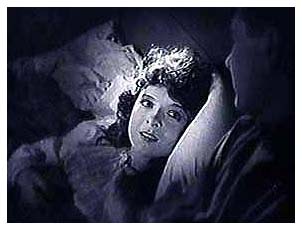
The Sky Pilot is a 1921 American silent drama film based on the novel of the same name by Ralph Connor. It is directed by King Vidor and features Colleen Moore. In February 2020, the film was shown in a newly restored version at the 70th Berlin International Film Festival, as part of a retrospective dedicated to King Vidor's career.
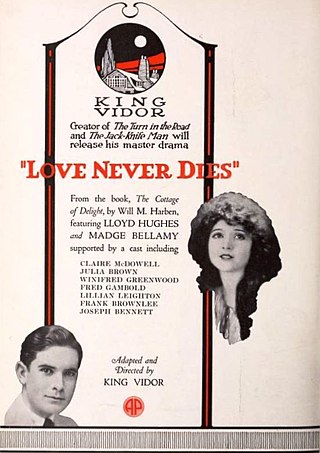
Love Never Dies is a 1921 American silent drama film directed by King Vidor. Prints of the film survive in several film archives.

Dusk to Dawn is a 1922 American silent drama film directed by King Vidor. It is unknown whether any recording of the film survives; it may be a lost film.

Conquering the Woman is a 1922 American silent drama film directed by King Vidor. A print of the film exists at the Cinematheque Royale de Belgique in Belgium.

Peg o' My Heart is a 1922 American silent drama film directed by King Vidor and starring Laurette Taylor. It is based on the 1912 play written by Taylor's husband J. Hartley Manners. The play starred Laurette Taylor and famously ran a record number of performances on Broadway. Six reels of the original eight reels survive at the Library of Congress.
Three Wise Fools is a 1923 American silent drama film directed by King Vidor. A print of the film exists at the Cinematheque Royale de Belgique. It showed in Germany at the Union-Theater Nollendorf, Berlin, on November 10, 1924. The cinema was built in 1913 by Joe Goldsoll, who was president of Goldwyn Pictures from 1922-1924.

Wine of Youth is a 1924 American silent comedy drama film directed by King Vidor, and released by Metro-Goldwyn-Mayer, shortly after the merger which created MGM in April 1924. Vidor did not consider it important enough to mention in his autobiography, although it did advance the careers of three young stars-to-be: Ben Lyon, Eleanor Boardman, and William Haines.

His Hour is a 1924 American silent drama film directed by King Vidor. This film was the follow-up to Samuel Goldwyn's Three Weeks, written by Elinor Glyn, and starring Aileen Pringle, one of the biggest moneymakers at the time of the Metro-Goldwyn-Mayer amalgamation.

Proud Flesh is a 1925 American silent comedy-drama film directed by King Vidor and starring Eleanor Boardman, Pat O'Malley, and Harrison Ford in a romantic triangle.
La Bohème is a 1926 American silent drama film directed by King Vidor, based on the 1896 opera La bohème by Giacomo Puccini. Lillian Gish and John Gilbert star in a tragic romance in which a tubercular seamstress sacrifices her life so that her lover, a bohemian playwright, might pen his masterpiece. Gish, at the height of her influence with Metro-Goldwyn-Mayer studios, asserted significant control over the production, determining the story, director, cast, cinematography, and costume design. In February 2020, the film was shown at the 70th Berlin International Film Festival, as part of a retrospective dedicated to King Vidor's career.

Bird of Paradise is a 1932 American pre-Code romantic adventure drama film directed by King Vidor and starring Dolores del Río and Joel McCrea. Based on the 1912 play of the same name by Richard Walton Tully, it was released by RKO Radio Pictures.
















